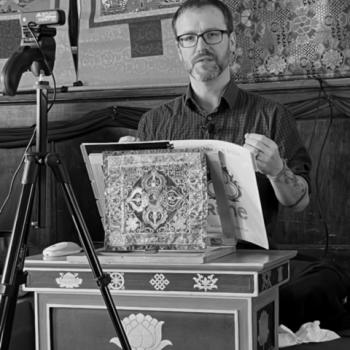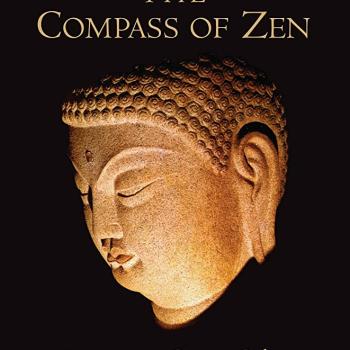The Supreme Way is not difficult
If only you do not pick and choose.
Neither love nor hate,
And you will clearly understand.
Be off by a hair,
And you are as far from it as heaven from earth.
This is how Sengcan’s poem “Faith in Mind” begins. It’s about cultivating equanimity and practicing without a goal in mind.
The Supreme Way at the beginning refers to Enlightenment. The wisdom of the Buddha, the wisdom of Emptiness seems really hard for us to grasp. But the teachings tell us that Buddha nature is our true nature, that we have the awakened state already.
The second line tells us what stops us from realizing our awakened state. Picking and choosing. I want this, I don’t want that. What I call the mind that says “I-Me-Mine” all the time. We often make our problems worse when we try to get out of them, especially when we pretend they don’t exist.
The third and fourth lines tell us that if we can get away from this “I-Me-Mine” mentality, then Enlightenment is ours. It’s said that if we stop thinking with this dualistic mind, then we can immediately awaken.
This relates to our sitting practice. When we sit, sometimes we don’t want to. Sometimes we are distracted. We think about things we’d rather be doing. That’s the mind of picking and choosing.
Putting great importance on likes and dislikes can tend to get in the way of our practice. If we can just let things happen and let the world unfold as it is, then we will be happier.
There’s a saying that goes: “Put down the myriad thoughts. Take up the practice.” The myriad thoughts are all those things that take us out of our practice. And we want to think about these other things. We want to be distracted.
That’s what we’re talking about here. When we are engaged in sitting practice, but our monkey minds take us all over the place, that’s picking and choosing. Our minds are trying to choose anything but sitting still.
Sengcan’s point is that just keeping in mind, “Avoid picking and choosing” can be helpful to us.
If you want the Way to appear,
Be neither for nor against.
For and against opposing each other –
This is the mind’s disease.
We should see the world as it is, not as we wish it to be. So often we are overcome by our expectations. There’s a quote that’s usually attributed to Shakespeare that says, “Expectation is the root of all heartache.” That could easily be a Buddhist message.
Our preferences include anything we want to have and also anything we want to avoid. Although like and dislike are opposites, they really come from the same root. That root is expecting the world to follow our wishes.
Without recognizing the mysterious principle
It is useless to practice.
If we don’t realize the harm that expectation brings to us, then our efforts in practice will not get us very far. As the Buddha said, “The cause of suffering is attachment.” That’s what this is about. Our attachments to our expectations.
The Way is perfect like great space,
Without lack, without excess.
Because of grasping and rejecting,
You cannot attain it.
Great space refers to Emptiness. It is one of those ideas that people sometimes struggle to understand. It doesn’t mean there’s nothing, but that there’s nothing for us to cling to. All things are connected. Everything is included. There is no gain and loss because all things are interconnected. There is nothing outside of us.
I like to think of that in terms of one of my favorite songs. In what I think is a lesser known song the Beatles said, “Love is all and love is everyone.”
If we can just stop grasping we can come to realize that there is no excess or lack. Then we can just let the universe unfold.
Do not pursue conditioned existence;
Do not abide in the acceptance of emptiness.
People can be attached to worldly things or attached to Emptiness.
In the Buddha’s life story it’s said that he grew up having every worldly pleasure imaginable. It’s said that his father kept reality hidden from him, so he grew up with no knowledge of suffering, illness, or death. I think it’s a little far-fetched that it could have been quite that extreme BUT I can imagine that he was a very spoiled child, having his every whim catered to because he was royalty.
That is attachment to worldly things. The historical Buddha didn’t find fulfillment even though he had everything. What do you do when you have everything?
So he tried the opposite. He learned from some spiritual teachers in the forest who told him the road to Enlightenment was in giving up everything, giving up all worldly pleasures.
So he tried that. He stopped eating, stopped taking care of his body, and did marathon meditation sessions, thinking that this would bring him to Enlightenment.
This is attachment to Emptiness. And he found that that didn’t fulfill him either. Giving up everything just made him sick, it didn’t bring Enlightenment.
The text here is telling us we shouldn’t be attached to worldly things but we also shouldn’t be attached so spiritual things.
These are both forms of attachment, although they seem different.
In oneness and equality,
Confusion vanishes of itself.
Seeing that all is one means transcending distinctions, seeing that there’s really no difference between the shore of suffering and the other shore. It’s so hard. When you can come to an Enlightenment experience, that all things are connected, then your delusions will naturally fade. The truth is that Emptiness and existence aren’t separate, certainly not as separate as we think they are.
Stop activity and return to stillness,
And that stillness will be even more active.
Originally we might think our minds are relatively stable. When we try to still the mind we come to realize that it’s not stable at all. Our mind jumps around all the time, consistently losing focus on what we’re trying to do. That’s why it’s sometimes referred to as “monkey mind”. Like monkey, jumping from tree to tree and never sitting still.
When we are meditating, we want to focus completely on the practice and avoid thinking about how well we’re doing or how much trouble we’re having. We need to practice with an even mind and especially not beat ourselves up when we are having difficulty.











